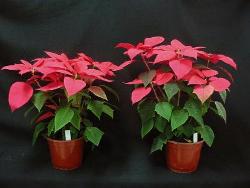Nov 5 2009
Light manipulation technique effective, environmental alternative for growing holiday favorite
Poinsettias can be a lucrative crop for ornamental plant growers, particularly during the Christmas season. In the temperate regions of the southern hemisphere, where poinsettias are grown for both export and local markets, high-demand time for holiday sales occurs during the summer, when warm temperatures and stronger light can accelerate plant growth, often resulting in unmarketable plants.
 This photo shows poinsettia plants cultivated under a photoselective (left) and a transparent (right) film
This photo shows poinsettia plants cultivated under a photoselective (left) and a transparent (right) film
To produce more sought-after consumer favorites, commercial growers are challenged to control poinsettias' growth rates in unfavorable environmental conditions. Many growers use chemical plant growth regulators (PGRs) to achieve desired plant height, but the high cost of PGRs, environmental use restrictions, and increasing pressure from consumers to find alternatives to contaminant chemicals are driving researchers to explore new, sustainable alternatives.
Prior research has reported the successful use of a technique termed "light manipulation" to affect plant height in some ornamental plants. The technique involves using specific photoselective films to reduce the far-red component of light in the environment surrounding the plants. Consequently, the proportion of the active form of the phytochromes—a family of photoreceptors that absorb red and far-red light in plants—increases, playing an important role in defining the makeup of plants and, ultimately, their market value.
Argentine researchers recently completed a study to determine if manipulation of light quality can be a successful alternative to the use of chemical plant growth regulators for producing high-quality poinsettia plants. Diego A. Mata of the Instituto de Floricultura (INTA) and Javier F. Botto of the Universidad de Buenos Aires published the results of their experiment in a recent issue of HortScience.
The team evaluated different architectural and quality components of 'Freedom Red' poinsettia plants cultivated with natural radiation under different red (R) and far-red (FR) ratios in combination with or without the application of plant growth regulators. Photoselective film was used to significantly reduce the FR component of the light, and a transparent film was used as control to obtain high and low R/FR ratios (5.7 and 1.1, respectively).
Results of the experiments indicated that poinsettia plants cultivated under a high R/FR ratio were shorter and more compact than those grown under transparent film. Flowering time was slightly delayed in plants grown under a high R/FR ratio compared with those cultivated under the control treatment. Additive effects were detected between light quality and PGR factors, indicating that light quality manipulation is an alternative strategy to reduce or to replace the use of PGRs in commercial production systems that usually require several PGR applications.
"In summary", stated Mata and Botto, "our results show that light manipulation is an effective alternative to the application of PGR to control plant architecture in 'Freedom Red' poinsettias without affecting plant quality components under high natural irradiance conditions of temperate regions. The use of photoselective filters that increase the R/FR ratio in the cultivation environment reduces plant height and conserves the plant quality parameters."
Although the experiment suggests that light manipulation can be beneficial for producing ornamental poinsettia plants using an environmentally friendly strategy, the scientists caution that the techniques used in this study should be evaluated under realistic production systems before it can be recommended to growers.